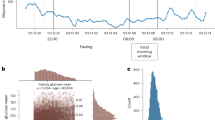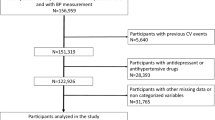Abstract
Background/Objectives:
To assess dietary habitual sodium intake and the association between daily sodium intake and anthropometric indices, food habits and hypertension in the sample of adult male population participating in the Olivetti Heart Study.
Subjects/Methods:
The study population was composed of 940 men participating in the 2002–2004 follow-up examination of the Olivetti Heart Study. Blood pressure, anthropometric indices, biochemical parameters and sodium excretion in a 24-h urine collection were measured. The frequency of consumption of selected foods was estimated by a food frequency questionnaire (FFQ) capturing the previous year data. In a subgroup of the study population (n=138), the fractional excretion of sodium was estimated by endogenous lithium clearance.
Results:
Dietary sodium intake estimated by 24 h urinary excretion was 203±70 mmol/day. Sodium excretion was significantly lower in treated hypertensive patients and higher in overweight/obese participants when compared with normotensive and normal-weight individuals, respectively. In addition, the inverse correlation detected in normal-weight individuals (r=−0.321; P<0.05) between fractional proximal tubular sodium reabsorption and dietary sodium intake was disrupted in overweight/obese individuals (r=0.058; P=NS). The independent determinants of 24 h urinary sodium excretion were body mass index (BMI), the occurrence of antihypertensive treatment, and frequency of consumption of pasta and cold cuts.
Conclusions:
Habitual salt intake in this sample of male adult population in southern Italy was well above the recommended amounts. A higher salt intake and an altered renal sodium handling were observed in overweight and obese participants. Sodium intake was only slightly reduced in hypertensive participants on pharmacological therapy.
This is a preview of subscription content, access via your institution
Access options
Subscribe to this journal
Receive 12 print issues and online access
$259.00 per year
only $21.58 per issue
Buy this article
- Purchase on Springer Link
- Instant access to full article PDF
Prices may be subject to local taxes which are calculated during checkout

Similar content being viewed by others
References
Barba G (2008). Salt wars: do we need another episode? Am J Hypertension 21, 1173.
Cappuccio FP (2007). Salt and cardiovascular disease. BMJ 334, 859–860.
Cappuccio FP, Strazzullo P, Farinaro E, Trevisan M (1993). Uric acid metabolism and tubular sodium handling. Results from a population- base study. JAMA 270, 354–359.
Folkerd E, Singer DR, Cappuccio FP, Markandu ND, Sampson B, MacGregor GA (1995). Clearance of endogenous lithium in humans: altered dietary salt intake and comparison with exogenous lithium clearance. Am J Physiol 268, F718–F722.
Frost CD, Law MR, Wald NJ (1991). By how much does dietary salt reduction lower BP? II- Analysis of observation data within populations. BMJ 302, 815–818.
Geleijnse JM, Kok FJ, Grobbee DE (2003). Blood pressure response to changes in sodium and potassium intake: a metaregression analysis of randomised trials. J Human Hypertens 17, 471–480.
He FJ, MacGregor GA (2002). Effect of modest salt reduction on blood pressure: a meta-analysis of randomized trials. Implications for public health. J Human Hypertens 16, 761–770.
He J, Ogden LG, Vupputuri S, Bazzano LA, Loria C, Whelton PK (1999). Dietary sodium intake and subsequent risk of cardiovascular disease in overweight adults. JAMA 282, 2027–2034.
He FJ, Mac Gregor GA (2004). Effect of longer-term modest salt reduction on blood pressure. Cochrane Database Syst Rev 3, CD004937.
INRAN Istituto Nazionale di Ricerca per gli Alimenti e la Nutrizione (2003). Linee Guida per una corretta alimentazione nella popolazione italiana. http://www.inran.it/files/download/linee_guida/.
INTERSALT Cooperative Research Group (1988). Intersalt: an international study of electrolyte excretion and blood pressure. Results for 24 h urinary sodium and potassium excretion. BMJ 297, 319.
Law MR, Frost CD, Wald NJ (1991). By how much does dietary salt reduction lower blood pressure? III- Analysis of data from trials of salt reduction. BMJ 302, 819.
Leclercq C, Ferro-Luzzi A (1991). Total domestic consumption of salt and their determinants in three regions of Italy. Eur J Clin Nutr 45, 151–159.
Nagata C, Takatsuka N, Shimizu N, Shimizu H (2004). Sodium intake and risk of death from stroke in Japanese men and woman. Stroke 35, 1543–1547.
Phillips B (2003). The JNC 7 hypertension guidelines. JAMA 289, 2560–2572.
Sacks FM, Svetkey LP, Vollmer WM, Appel LJ, Bray GA, Harsha D et al. (2001). Effects on blood pressure of reduced dietary sodium and the dietary approaches to stop hypertension (DASH) diet. N Engl J Med 344, 3–10.
Stamler R, Stamler J, Gosch FC, Civinelli J, Fishman J, McKeever P et al. (1989). Primary prevention of hypertension by nutritional-hygienic means: final report of a randomized controlled trial. JAMA 261, 1801–1807.
Strazzullo P, Barba G, Cappuccio FP, Siani A, Trevisan M, Farinaro E et al. (2001). Altered renal sodium handling in men with abdominal adiposity: a link to hypertension. J Hypertens 19, 2157–2164.
Strazzullo P, Barbato A, Galletti F, Siani A, Iacone R, D'Elia L et al. (2006). Abnormalities of renal sodium handling in the metabolic syndrome. Results of the Olivetti Heart Study. J Hypertens 24, 1633–1639.
Strazzullo P, Iacoviello L, Iacone R, Giorgione N (1988). Use of fractional lithium clearance in clinical and epidemiological investigation: a methodological assessment. Clin Sci 74, 651–657.
Strazzullo P, Trevisan M, Farinaro E, Cappuccio FP, Ferrara LA, Mancini M (1983). Characteristics of the association between salt intake and blood pressure in a sample of male working population in southern Italy. Eur Heart J 4, 608–613.
Tuomilehto J, Jousilahti P, Rastenyte D, Moltchanov V, Tanskanen A, Pietinen P et al. (2001). Urinary sodium excretion and cardiovascular mortality in Finland: a prospective study. Lancet 357, 848–851.
WHO (2006). World Health Report. www.who.int/dietphysicalactivity/reducingsalt/en/.
Acknowledgements
The present paper has been developed within the activities of the InterSocietal Working Group for the Reduction of Salt Intake in Italy (Co-ordinator professor Pasquale Strazzullo, www.menosalepiusalute.it).
Author information
Authors and Affiliations
Corresponding author
Ethics declarations
Competing interests
The authors declare no conflict of interest.
Rights and permissions
About this article
Cite this article
Venezia, A., Barba, G., Russo, O. et al. Dietary sodium intake in a sample of adult male population in southern Italy: results of the Olivetti Heart Study. Eur J Clin Nutr 64, 518–524 (2010). https://doi.org/10.1038/ejcn.2010.22
Received:
Revised:
Accepted:
Published:
Issue Date:
DOI: https://doi.org/10.1038/ejcn.2010.22
Keywords
This article is cited by
-
Sodium intake assessed by 24-h urine excretion and its relationship with anthropometric measurements in Malaysian adults
Journal of Health, Population and Nutrition (2021)
-
Salt consumption and the risk of chronic diseases among Chinese adults in Ningbo city
Nutrition Journal (2020)
-
How Much Intake of Sodium Is Good for Frailty? : The Korean Frailty and Aging Cohort Study (KFACS)
The Journal of nutrition, health and aging (2019)
-
Assessment of mineral intake in the diets of Polish postmenopausal women in relation to their BMI—the RAC-OST-POL study
Journal of Health, Population and Nutrition (2016)
-
The Longer-Term Effects of Roux-en-Y Gastric Bypass Surgery on Sodium Excretion
Obesity Surgery (2013)



